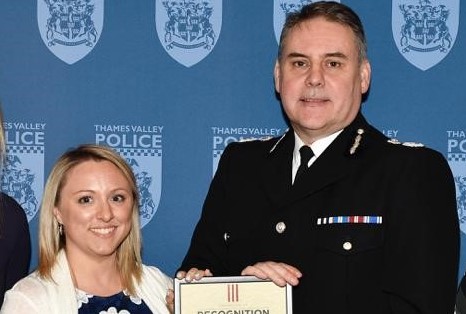Vetting Q&A
Meet Vivienne Melia, a Senior Vetting Adviser from Thames Valley Police.

Here, Vivienne explores the vital components of the police vetting process and gives her view on how to avoid some of the most common pitfalls.
Why is vetting so important?
The police vetting process is crucial in ensuring public confidence in the police service as a whole. The process assists with identifying any risks and areas of vulnerabilities associated with an individual. These can then be assessed appropriately to understand whether these present a risk to national security, police assets, the public or the individual and whether they could be managed and supported locally.
Those who are granted police vetting clearance are awarded a privileged position of trust, so identifying these areas are imperative to maintain confidence in the police service.
What are you mainly looking for?
Honesty, integrity and ethical behaviour are crucial factors considered within the police vetting process. This allows us to reassure the public that individuals in a position of trust have demonstrated their utmost integrity.
Where the applicant has demonstrated complete honesty and integrity, forces will be in a position to carefully assess if and how any identified risks can be managed. Any indication that the applicant is being deliberately misleading will be looked upon unfavourably and this is why honesty is the best policy.
Throughout your time as Senior Vetting Advisor, what are the most common mistakes you’ve noticed applicants making, and how can these be avoided?
From my experience, there are a few areas where concerns have been raised, but could have been avoided:
- Finances – run a free credit report before completing your application. It could highlight defaulted accounts or County Court Judgements that could easily be resolved or managed before you submit your vetting application.
- Inappropriate social media content – I would strongly advise applicants to review their public social media content before applying. Have you liked any posts or groups that represent a conflict in values with the police service? Do you really know all of your ‘friends’ you are linked to? Think about how your content could be perceived by the public or the press, as well as your own online personal security.
- Missing information – this often happens when applicants have rushed to submit their vetting form. Read through the questions carefully and any guidance available too. If you're unsure of what the question is asking you, contact the relevant vetting unit to clarify what information they require.
- Openness – we appreciate that in some cases you, or those around you, may have made mistakes in the past. Whilst it may be embarrassing or feel shameful to admit, it's important to disclose the information when requested.
Is there a misconception about vetting that you would want to clear up?
I believe there is a general misconception that you won't be accepted if you have a previous conviction or caution. Whilst there are some offences which would lead to a rejection in all cases (covered by Principle 12 of the College of Policing's Vetting Code of Practice), each case will be explored on its own merit. Elements taken into consideration include:
- Type and severity of conviction/caution
- Age at the time of the conviction/caution
- Time elapsed since the conviction/caution
- Whether the conviction/caution is a standalone incident or whether there is an indication of a pattern of behaviour
If you could give 3 top tips on vetting to candidates, what would they be?
- Always be honest – if you’re asking yourself whether you need to declare something on your vetting form, INCLUDE IT.
- Take your time – read the questions carefully and think about your answers. If you can’t provide the full details, state what you’re missing and why.
- Respond appropriately to any contact made – if you are unable to respond openly to questions at the time of contact (either by email or over the phone), let the case officer know a more appropriate time or method of contact.
Let’s explore the vetting process in greater detail, with more common errors, vetting top tips and some test scenarios.
